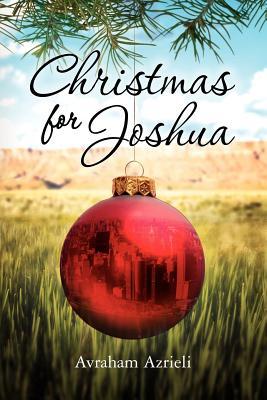Author: Avraham Azrieli
Title: Christmas for Joshua
Publisher: CreateSpace
ISBN: 9781463602888
Pages: 292, Paperback
Genre: Fiction
Author Interview with Avraham Azrieli
 Christmas for Joshua
Christmas for Joshua
By: Avraham Azrieli
Interviewed by: S. Marie Vernon, Pacific Book Review
Today we are speaking with author Avraham Azrieli. His latest novel is titled Christmas for Joshua, now available at Amazon and Barns & Noble. Avraham, thank you for taking some time to be with us.
AA: Thank you!
PBR: The world population of Jews is only about 2%. Please tell us what percent of this still practice as strict Orthodox Jews?
AA: It is hard to measure, because Jewish worship is not delineated strictly between denominations, and many Jews attend different synagogues (Orthodox, Conservative, Reform, or unaffiliated). The observance of traditional Orthodox rules, such as Sabbath and kosher diet, is common to perhaps a quarter of Jews. Christmas for Joshua takes readers into the midst of a family crisis involving a conflict of faith and parenting. The characters’ travails show how the technical harshness, which unfortunately, we see clergy often resort to in every religion, is a detriment to true spirituality and faith. It serves Christmas for Joshua as a wonderful foundation for a story of family conflict and redemption.
PBR: Tell us more about some of the differences of reformed Jews’ religious freedom as opposed to Orthodox Jews.
AA: It is more of a spectrum, where the most Orthodox (who usually wear black garb for men and long dresses and head covers for women) are strict observers of every last technical rule, permeating almost every part of daily life. The Jewish ‘Reform’ movement has historically sought to emphasize spirituality and humanism as the primary aspects of the Jewish faith, and allowed for ‘retirement’ of old rules in a continuous adaptation to modern life. The downside is a dramatic rise in assimilation and intermarriage, resulting in the majority of Reform Jewish family lines disappearing from Judaism after two or three generations.
PBR: Christmas for Joshua, in a clever way, turns the table on anti-Semitism and makes it about anti-Christian sentiment instead. Turning the tables this way, the book is unique and not just another feel-good Christmas story. Instead it has spiritual and historical depth and emotion that shakes the reader into some soul searching about their belief system or at least examining their religious boundaries and concepts they take for granted. What were some of your thoughts as you scoped out this reversal of animosity?
AA: I’m not sure it is animosity to Judaism or Christianity that I experienced or wished to express while writing Christmas for Joshua. The characters, of course, have their own feelings, which come from their personal histories involving both happy and traumatic experiences, just like the rest of us. But you are correct that the novel, through the characters, doesn’t shy away from showing the extremes to which religious dogma takes some people. In my opinion, human evil comes not from the religion of the perpetrator, but from much darker corners of human primal instincts. All too often, sadly, religion is used (and abused) by evil perpetrators as an excuse for heinous deeds. That’s what Christmas for Joshua is all about.
PBR: The origins of Christian based anti-Semitism against Jews has five main categories (according to Probe ministries www.probe.org/site:) shown below.
-resentment against people who do not accept Jesus as their savior
-revenge against people who made Jesus’ life difficult
-revenge against those who held back the first group to split off and become Christians
-revenge against Jewish leaders who crucified Jesus
-need for an economical, social and political scapegoat
How would you say the social phenomena of anti-Jewish sentiment changed recently in the 21st Century? In your opinion, are we as a society, getting any better or worse in this area?
AA: Unfortunately, anti-Semitism still burns hot, only that now, that Jews have returned to their ancestral land, anti-Semitism has taken the form of anti-Israel hate in much of the world. But that’s the subject of my earlier novels. As to Christian attitudes toward Jews, I think the Nazi Holocaust was the historic consequence of centuries of Christian hate of Jews. (See the excellent history of the subject in Constantine’s Sword, a book that traces the record of false accusations against Jews and the resultant Christian killings of Jews that started in 300 AD and lasted until the Holocaust.) The Holocaust, in its genocidal monstrosity, shocked Christians to the core and created a measure of guilt and desire to move on from the history of violent anti-Semitism. While American Christian denominations have been wonderful examples of tolerance and acceptance, it remains to be seen whether global Christianity at large maintains its post-Holocaust tolerance for long, or will return to the old anti-Semitism.
PBR: Going back to the theme of tolerance, especially where religion between couples is concerned, does this story stem strictly from interviews with other people or have you experienced anything first hand similar to what Rusty, the main character, has faced with his dual religious upbringing?
AA: From your question I can tell that you understand how a good novel comes to life. I think it was Hemingway who said that to write a novel “all you have to do is to sit down at a typewriter and cut open a vein.”
PBR: In Christmas for Joshua, do you like to think that Rusty will one day become an Orthodox Jew or do you relish his independence as a reform Jew?
AA: It is my feeling that Rusty is a good man whose heart is kind, despite his inclination to take conflicts to extremes—which makes for great entertainment! It’s hard to imagine him adopting wholeheartedly the highly technical Orthodox observance, especially if he doesn’t believe in it as God’s will.
PBR: In your own words, what is the fundamental message you wish your readers to get from Christmas for Joshua?
AA: I’m afraid my readers are too smart to be subjected to a ‘message.’ The novel is a story about people who—for me and I hope for my readers—are as real as family members. Even though I am Jewish (and grew up in Israel, where Christmas isn’t celebrated), I do love Christmas time—especially the songs (many of them were written by Jewish lyricists and composers). This dichotomy is shared by many Americans, whether or not they believe that Jesus was the Messiah or ‘only’ a righteous Jewish man named Joshua, who exemplified charity and compassion in times of oppression and political turmoil. This feeling of a ‘shared’ Christmas had inspired me to write Christmas for Joshua. I hope it inspires in my readers (of all faiths) a similar joy in this wonderful and very American holiday.
PBR: Again, thank you so much for spending some time with us, and we wish you the best of success with your latest novel.
AA: Thank you, and Merry Christmas!
Read Christmas for Joshua in the Author Spotlight
Read review of Christmas for Joshua


